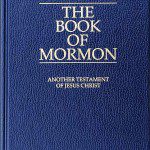
With friends, we enjoyed a good dinner tonight at the Golden Thai in Orem. Good food. A family-owned restaurant. Really friendly service. Then we all headed over to The Noorda Center for the Performing Arts, on the campus of Utah Valley University, where we attended a sold out show by Bernadette Peters. The music wasn’t my favorite — she did a lot of Stephen Sondheim, for example, and, for some reason, I am almost completely impervious to Mr. Sondheim’s charms — and her style has never really been my style. But it was interesting to see a legend in live performance. She put on a good show, and the audience loved it.
It’s great to have this new performing arts complex, The Noorda, within just a short distance of our house. (It’s even closer to us than BYU.)
I have, by the way and for what little it’s worth, now seen two famous actors who’ve played the role of Dolly Gallagher Levi in Hello, Dolly! on Broadway. Bernadette Peters played Dolly from 20 January 2018 until 15 July 2018. And the great Carol Channing (31 January 1921 – 15 January 2019) made Dolly her signature role.
My wife and I were once in a restaurant in Manhattan, quite a few years ago. We had just sat down when, suddenly, we heard a very distinctive voice and laugh. Carol Channing was sitting at the table next to ours. One of those weird little experiences that are never quite forgotten.
***
But, now, a complete shift of gears:
In Islam, a hadith is a report of something that the Prophet Muhammad said or did that can serve as a precedent for the believers. A special type of hadith, a hadith qudsi (also called a hadith rabbani or a hadith ilahi [“divine hadith”]) is a saying of the Prophet in which the meaning was revealed by God and the phrasing is formulated by the Prophet. Unlike the “ordinary” prophetic hadith (hadith nabawi), in which both the meaning and the phrasing come from the Prophet, the chain of transmission is traced back directly to God instead of ending with Muhammad. Thus, the hadith qudsi stands somewhere between the more common hadith, on the one hand, and, on the other, the Qur’an, which is considered divine revelation in both meaning and wording. It functions, really, as extra-Qur’anic revelation, inferior to the Qur’an itself but superior to the ordinary hadith.
All of which leads up to the hadith qudsi that I wanted to mention here. This one is attributed to the Prophet Muhammad on the authority of Anas b. Malik (and collected in the Sahih of al-Bukhari). The speaker is God:
When a servant of mine advances a foot toward me, I advance a yard toward him. And when he advances a yard toward me, I advance toward him the length of his arms spread out. When he comes walking toward me, I go to him running.











